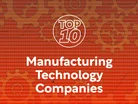Top 10: Manufacturing Technology Companies

Manufacturing technology companies have their work set out for them — from keeping their supply chains running on schedule to ensuring slave labour is eradicated and fair wages are upheld — in addition to keeping prices low for consumers. Scope 3 emissions are being monitored, female leadership quotas are under watch and packaging must be recyclable.
In addition to the technology these manufacturers build, many also cross over into other sectors, such as energy, aerospace and healthcare technologies.
GE, Siemens, Schneider Electric, Honeywell, ABB, Bosch, NVIDIA, Mitsubishi, Dassault Systèmes, Rockwell Automation and Stratasys are our Top 10 manufacturing technology companies. Here’s why…
10. Rockwell Automation
Headquartered in Milwaukee, Wisconsin, Rockwell Automation had a US$9bn revenue in 2023. As a leading provider of industrial automation and digital transformation solutions, Rockwell Automation embraces Industry X principles to help its customers strengthen their operational efficiency. The automation and control systems which Rockwell Automation builds use industrial components, such as programmable logic controllers, human-machine interfaces and sensors. These allow for real-time control of industrial processes that streamline operations and prevent downtime.
9. Dassault Systèmes
Dassault Systèmes offers customers access to collaborative virtual environments to ‘imagine sustainable innovations’ with its virtual twin experiences. Using Manufacturing Execution Systems (MES), a system that monitors goods from a raw material to the final product.
Based in Vélizy-Villacoublay, France, Dassault Systèmes was founded in 1981 and is a part of the Dassault Group. Dassault Systèmes had a US$bn revenue in 2023 and aims for 2040 climate neutrality. Its 20,000 employees support 290,000 customers across 140 countries.
8. Mitsubishi
Japan's biggest general trading company, Mitsubishi, was founded in 1921. The Mitsubishi logo, three diamonds arranged in a triangular shape, represents its company: reliability, integrity and success.
Mitsubishi employs 60,000 people and has 200 bases of operations in 80 countries worldwide. In 2023, it had a US$159bn revenue. The company uses Industrial Internet of Things, which allows shop floor monitoring, enabling machines and equipment from different manufacturers to communicate with each other and Mitsubishi staff.
7. Nvidia
NVIDIA is an AI innovator. The company is based in Santa Clara, California, and has more than 50 offices worldwide. Founded in 1993, more than 35,000 businesses now use NVIDIA AI technologies and 15,000 global startups are part of the NVIDIA Inception programme.
Since its 1999 invention of the GPU, which led to large acceleration of PC gaming, NVIDIA has led the market. Its scientists, researchers and developers have gone on to influence the manufacturing industry, with NVIDIA technology.
6. Bosch
Bosch’s technology is ‘invented for life’. The Bosch Group supplies various technologies across its four business sectors — Mobility Solutions, Industrial Technology, Consumer Goods and Energy and Building Technology. The company is based in Gerlingen, Germany and in 2023 had a US$93bn sales revenue, a 12% increase from last year. Using Industry X, Bosch is strengthening the digital transformation across its robotic solutions. The Bosch Group has been carbon neutral since 2020 and employs 85,500 associates in research and development.
5. ABB
Global technology company ABB uses smart manufacturing across its operations. It makes electrical equipment from lighting to power converters. Based in Zürich, Switzerland, ABB was founded in 1988 and in 2022, hit a US$29bn revenue. Its 105,000 employees are ‘committed to driving innovations that accelerate industrial transformation’. Most recently, ABB has signed an agreement with gravity energy storage company Gravitricity, to explore which technologies can advance the development of gravity energy storage systems in former mines.
4. Honeywell
Founded in 1906, Honeywell focuses on aerospace and a range of technologies, although it might be best known for its thermostatic heating control. The Fortune 100 company is based in Charlotte, North Carolina, and is led by Vimal Kapur, the Managing Director. With its knowledge and expertise around automation, data analytics and connectivity, Honeywell is developing new smart manufacturing solutions with the goal of improved safety and advanced sustainability. Honeywell’s smart manufacturing technologies are also used to improve productivity.
3. Schneider Electric
At Schneider Electric there is one goal, to empower customers to ‘make the most of energy and resources, bridging progress and sustainability for all’. The automation machinery manufacturing giant uses smart manufacturing to increase efficiency and productivity as well as strengthen sustainability within its operations. Using digital twin technology, Schneider Electric builds virtual models of processes — which simulate the performance of systems in the real-world — to help businesses avoid downtime. Headquartered in Rueil-Malmaison, France, the company had a 2022 revenue of US$34bn.
2. Siemens
Siemens is based in Munich, Germany and was founded in 1847. The company is so widespread that, chances are, that right now you’re not far from a Siemens product. The automation machinery manufacturer designs transportation solutions, from trains to signalling systems, as well as building technologies including fire safety systems and security solutions. More recently, the company has started work on smart building technologies for smart buildings. These are designed for the customer who wants the benefits of lower energy consumption with sustainability in mind.
Siemens is also a big name in the energy and healthcare sectors, manufacturing medical imaging equipment such as MRI machines and X-ray machines, while supporting companies and countries as they reduce greenhouse gas emissions and make energy more affordable.
In industrial automation, the company builds items such as process automation and robotics, while consumers will also be familiar with home appliances, from washing machines to fridges.
1. General Electric
Founded 1892, General Electric manufactures items across energy, aerospace and healthcare, building CT scanners and ultrasound systems for hospitals as well as jet engines, in addition to integrated systems for commercial, military, business and general aviation aircraft.
GE is also known for its offshore and onshore wind turbines. During COP28, GE Vernova announced its collaboration with Alfanar Construction and the Saudi Electric Company, to assist in the transition of turbines run on fuel to natural gas instead. GE Vernova made a commitment that at least 10% of all steel purchased will be near zero emissions by 2030.
“GE Vernova is proud to join the First Movers Coalition (FMC) as we focus on accelerating the path to more reliable, affordable, and sustainable energy,” said Scott Strazik, CEO of GE Vernova. “As we continue our work to electrify and decarbonise the world, the FMC’s initiative provides an important opportunity to succeed in product stewardship and energy at the same time.”
******
Make sure you check out the latest edition of Manufacturing Digital and also sign up to our global conference series - Procurement & Supply Chain 2024 & Sustainability LIVE 2024
******
Manufacturing Digital is a BizClik brand
- Siemens, Sony & NVIDIA Unveil New Industrial AI Tools at CESAI & Automation
- Mother Nature Knows Best: Biomimicry in Manufacturing, Pt 1Smart Manufacturing
- Microsoft, ABB & Chevron: How to Scale Smart FactoriesAI & Automation
- Manufacturing Unwrapped: BASF, ABB & Chemical CircularitySustainability & ESG




